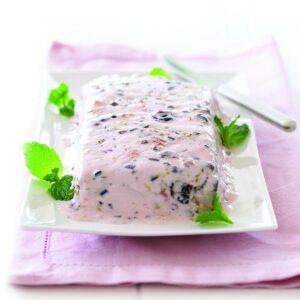
For decades fermentation was used to preserve foods, enhance shelf life, and improve flavour. But many people are not aware about the health benefits of fermented food.
Fermented foods are generally defined as “foods or beverages produced through controlled microbial growth, and the conversion of food components through enzymatic action”. That might be pickled cabbage or sauerkraut, the yoghurt drink kefir, sourdough bread and some pickles (only the lacto-fermented ones).
Fermented foods are rich in beneficial microbes and useful metabolites (substances produced during fermentation by bacteria and good for a healthy gut).
Several prominent research groups have suggested fermented foods may offer many health benefits, encourage weight loss and reduce risk of some diseases.
Food organisations and groups such as the Association of UK Dietitians now recommend eating fermented foods more often. For example, fermented milk and yoghurt are now being given to young children from the age of six months to help provide a good nutrient balance, to prevent iron deficiency in populations using cow’s milk and to reduce gastrointestinal infections.
Another study found regular consumption of fermented foods could be especially important for low income, resource-challenged communities who are disproportionally susceptible to gastrointestinal infections like E. coli and Listeria.
Why do fermented foods work?
During fermentation, bacteria can produce vitamins and useful metabolites. Fermented foods contain potentially probiotic microorganisms such as lactic acid bacteria. And, despite the short time these bacteria spend in the gut, they help with food digestion and boost our immune system. Probiotics in fermented food also strengthen the walls of the intestines to keep them from leaking their contents into blood so fermented food can contribute to the prevention of leaky-gut syndrome. It has also been found to contribute to prevention and treatment of diseases such as allergies and eczema.
Consumption of kimchi and other fermented vegetables may reduce asthma and atopic dermatitis. Other studies report the effect of fermented foods on reducing risks of type 2 diabetes and high blood pressure. Consumption of fermented milk products reduced the risk of bladder cancer.
Yoghurt-rich diets showed a reduced risk of metabolic syndrome, in older Mediterranean adults where a cluster of conditions occur together (including increased blood pressure, high blood sugar and excess body fat).
Probiotics in fermented foods have health-promoting properties such as lowering cholesterol; one study demonstrated that several lactic acid bacterial strains have properties to lower blood cholesterol.
There appear to be other possible benefits, but more research is needed. A recent review demonstrated the anti-cancer properties of lactic acid bacteria in fermented food on a variety of tumour cells from intestine, liver and breast as they modulate the development of tumours. A diet composed of conjugated linoleic acid-rich foods, particularly cheese, may protect against breast cancer in post-menopausal women. However, not all studies agree and a pilot study in mice even suggested increased tumour growth.
Improving mood and sleep
Fermented foods are also shown to improve mood and sleep. Prebiotics, found in fermented food, are non-digestible ingredients that selectively stimulate the growth and activity of beneficial bacteria in our gut. So eating fermented foods can make you feel happier as prebiotics in fermented food boost the gut’s health and promote the growth of several types of beneficial bacteria. This results in healthy levels of serotonin hormone which helps to stabilise moods, regulate feelings of wellbeing and happiness, regulate anxiety and control sleep. Fermentation-enriched chemicals are also linked to positive mental health. For a good sleep, you need to be kind to your gut and eating fermented food such as yoghurt, sauerkraut or kimchi before bedtime could help overcome insomnia.
During fermentation, lactic acid bacteria produce conjugated linoleic acids which have shown to have a blood pressure lowering effect. If the person has hypertension, they are more likely to experience mood issues (such as anxiety and depression) than a person with normal blood pressure.
Despite the many reported health benefits of fermented food some people may experience side effects. The most common reaction is a temporary increase in gas and bloating. This is the result of excess gas being produced after probiotics kill harmful gut bacteria and fungi.
Unfortunately others may experience headaches or a migraine, prompted by eating sauerkraut or kimchi, and this could be connected to histamines found in a plentiful amount in fermented foods. While symptoms of histamine intolerance may vary, some common reactions include headaches or migraines, nasal congestion or sinus issues, nausea and even vomiting (however this is relatively rare).
Over the centuries many people have eaten fermented food for convenience without realising their health benefits. Luckily many fermented foods are cheap and not complicated to make, giving us an easy way to improve our health and wellbeing.![]()
This article is republished from The Conversation under a Creative Commons license. Read the original article.
You might also be interested in:
Article sources and references
- Marco ML, Heeney D, Binda S, Cifelli CJ, Cotter PD, Foligné B, Gänzle M, Kort R, Pasin G, Pihlanto A, Smid EJ, Hutkins R. Health benefits of fermented foods: microbiota and beyond. Curr Opin Biotechnol. 2017 Apr;44:94-102. doi: 10.1016/j.copbio.2016.11.010. Epub 2016 Dec 18. PMID: 27998788.https://pubmed.ncbi.nlm.nih.gov/27998788/
- Marco ML, Heeney D, Binda S, Cifelli CJ, Cotter PD, Foligné B, Gänzle M, Kort R, Pasin G, Pihlanto A, Smid EJ, Hutkins R. Health benefits of fermented foods: microbiota and beyond. Curr Opin Biotechnol. 2017 Apr;44:94-102. doi: 10.1016/j.copbio.2016.11.010. Epub 2016 Dec 18. PMID: 27998788.https://pubmed.ncbi.nlm.nih.gov/27998788/
- Feng, R., Chen, L. & Chen, K. Fermentation trip: amazing microbes, amazing metabolisms. Ann Microbiol 68, 717–729 (2018). https://doi.org/10.1007/s13213-018-1384-5https://annalsmicrobiology.biomedcentral.com/articles/10.1007/s13213-018-1384-5
- Hill D, Sugrue I, Arendt E, Hill C, Stanton C, Ross RP. Recent advances in microbial fermentation for dairy and health. F1000Res. 2017;6:751. Published 2017 May 26. doi:10.12688/f1000research.10896.1https://www.ncbi.nlm.nih.gov/pmc/articles/PMC5464223/
- Ebner S, Smug LN, Kneifel W, Salminen SJ, Sanders ME. Probiotics in dietary guidelines and clinical recommendations outside the European Union. World J Gastroenterol. 2014;20(43):16095-16100. doi:10.3748/wjg.v20.i43.16095https://www.ncbi.nlm.nih.gov/pmc/articles/PMC4239494/
- Kort, R., Westerik, N., Mariela Serrano, L. et al. A novel consortium of Lactobacillus rhamnosus and Streptococcus thermophilus for increased access to functional fermented foods. Microb Cell Fact 14, 195 (2015). https://doi.org/10.1186/s12934-015-0370-xhttps://microbialcellfactories.biomedcentral.com/articles/10.1186/s12934-015-0370-x
- Yan F, Polk DB. Probiotics and immune health. Curr Opin Gastroenterol. 2011;27(6):496-501. doi:10.1097/MOG.0b013e32834baa4dhttps://www.ncbi.nlm.nih.gov/pmc/articles/PMC4006993/
- S C Larsson, S Andersson, J Johansson, A Wolk, Cultured milk, yogurt, and dairy intake in relation to bladder cancer risk in a prospective study of Swedish women and men, The American Journal of Clinical Nutrition, Volume 88, Issue 4, October 2008, Pages 1083–1087, https://doi.org/10.1093/ajcn/88.4.1083https://academic.oup.com/ajcn/article/88/4/1083/4650143?login=true
- PREDIMED Investigators, Consumption of Yogurt, Low-Fat Milk, and Other Low-Fat Dairy Products Is Associated with Lower Risk of Metabolic Syndrome Incidence in an Elderly Mediterranean Population, The Journal of Nutrition, Volume 145, Issue 10, October 2015, Pages 2308–2316,https://academic.oup.com/jn/article/145/10/2308/4590097
- Margaret Flowers, Joyce A. Schroeder, Alexander D. Borowsky, David G. Besselsen, Cynthia A. Thomson, Ritu Pandey, Patricia A. Thompson, Pilot study on the effects of dietary conjugated linoleic acid on tumorigenesis and gene expression in PyMT transgenic mice, Carcinogenesis, Volume 31, Issue 9, September 2010, Pages 1642–1649, https://doi.org/10.1093/carcin/bgq148https://academic.oup.com/carcin/article/31/9/1642/2477493
- Selhub EM, Logan AC, Bested AC. Fermented foods, microbiota, and mental health: ancient practice meets nutritional psychiatry. J Physiol Anthropol. 2014;33(1):2. Published 2014 Jan 15. doi:10.1186/1880-6805-33-2https://www.ncbi.nlm.nih.gov/pmc/articles/PMC3904694/
- Probiotics Center. Bloating and Probiotics • Why Probiotics Cause Gas & How to Avoidhttps://probioticscenter.org/bloating-and-probiotics/
www.healthyfood.com










